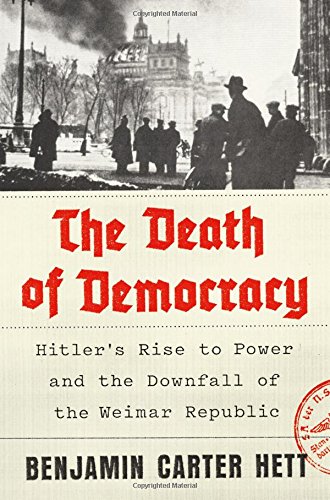–book review by Jens Kruse —
Benjamin Carter Hett opens his book The Death of Democracy. Hitler’s Rise to Power and the Downfall of the Weimar Republic (New York: Henry Holt, 2018) with the burning of the Reichstag during the night of Monday, February 27, 1933, “the last night of the Weimar Republic, the last night of German democracy” (3).
This event, even more than Hitler’s ascension to the chancellorship on January 30, 1933, was the hinge moment in history when Germany’s slide from democracy to dictatorship, peace to war, culture to barbarism became irreversible.
In the next eight chapters, Hett, a professor of history at Hunter College and the Graduate Center of the City University of New York, carefully tries to answer the question he asks in his “Introduction”: “How could this happen” (7)?
How could a state that was in many ways the most modern and most exemplary of European democracies descend into dictatorship? The German Republic that had emerged from the post- World War I chaos into the mid- and late 20s had some of the world’s most advanced social systems, led the world in its art, music, film and literature, was unrivaled in its reputation in science and scholarship. How could a people capable of such achievements follow a dictator into war and genocide?
The answer is, of course, complex. Hett explains the many factors that led to these catastrophic developments in clear and vivid prose. Among the factors are: the trauma of the world war, and especially of its ending; the conspiracy theory that attributed losing the war to a treacherous “stab in the back” of the military and the country by communists, socialists and Jews; Hitler’s rise as a politician on the strength of his lies, his propaganda, and his myth-making; the deep divisions in German society between anti-democratic conservatives and communists on the one side and democratic parties on the other; the divisions between Catholics and protestants; between the cities and the countryside. It did not help that, when the Walls Street crash of 1929 led to the world economic crisis, a crisis that in Germany was further intensified by the harsh terms of the Treaty of Versailles, German governments pursued a policy of austerity that drove more and more voters to the extremes and especially the Nazi Party. And even then the democracy of the Weimar Republic might have survived if a group of conservative politicians had not conspired to bring Hitler and the Nazis into the government for their own purposes, thinking that they could use him, that they could control him.
This, needless to say, turned out to be a miscalculation that led to catastrophic consequences for Germany, Europe, and the world.
In the more than seven decades since the end of World War II historians have told this story many times. So why tell it again? Hett is well aware of this question and he answers it straight on. First, history is an accreting form of knowledge: as archives become accessible and new documents become available historians have the opportunity for new insight and understanding. But second, and perhaps more importantly, each present sees the past from its particular perspective. And Hett makes clear that we live in such a present. He points out that “our time more closely resembles the 1930s than it does the 1990s” (10). Especially in its end stage the Weimar Republic struggled with questions like: “How should national borders be squared with ethnic identification? How should countries manage the rights of minorities? What should be done with refugees and other migrants?” (10).
The Nazis had definite and simplifying answers to these questions: answers that appealed to enough, though never a majority, of German voters to make Hitler chancellor and eventually dictator; answers that led inexorably to war and genocide.
Benjamin Carter Hett’s The Death of Democracy. Hitler’s Rise to Power and the Downfall of the Weimar Republic is important reading for our time. It can be checked out from the Orcas Library. It is available through Darvill’s Bookstore.
**If you are reading theOrcasonian for free, thank your fellow islanders. If you would like to support theOrcasonian CLICK HERE to set your modestly-priced, voluntary subscription. Otherwise, no worries; we’re happy to share with you.**









Also read: Fascism: A Warning. by Madeleine Albright. Available from the Orcas library.
Great review, Jens.
I could go through much detail to address society’s breakdown on both sides of the political divide as somewhat of a recipe for fixing this mess. So could you no doubt.
Or, I could point out the obvious overriding cause which, unless confronted, will sabatoge all other solutions.
A sitting president duly elected confronts pushback willing to turn logic and reason on its head to undue that fateful night.
Asking why prevents the clarity needed to address the inherent defects in our thinking.
Clearly, the societal result we find today comes from a profound misunderstanding of what “education” means..
This misunderstanding is the direct cause for where we’re at today – before the election, too; also, in Europe in the late 30’s.
Thus, we go around in circles instead of looking at ourselves in the mirror as we practice pagan rituals updated and sanitized to be prim and proper and thereby acceptable and “reasonable-sounding” when their very precepts (and that of our many other “belief” systems) so directly contradict any notion of rational thought and/or reasonable behavior.
How in the name of reason can we expect durable “reasonable” behavior at the societal level while its constituent parts (individuals) believe so deeply and profoundly in the most irrational of beliefs? And, worse, our irrational behavior and practices are enshrined and protected as fundamental rights in law? So, again, how?
What other possible outcome can there “ever be” in human affairs other than various forms of manifest insanity (abuse of others, abuse of self, violence at individual and state levels, etc) when reason and rational thought are so uniformly rejected?
The unspoken societal compromise to tolerate the billions of lives based on irrational beliefs in order to “keep the peace” is as lacking in reason as was trying to negotiate with Hitler.
My point: the end-runs around Reason won’t work because they cannot work. This means we live on borrowed time.
Alas, “Reason” as a pre-requisite for graduation is “politically incorrect” from all sides.
Hence, those who see the subterfuge can’t help but shake their heads.
Hey, you saying pagan perspectives are irrational and lack the reason you so adore? Consenting minds enshrine themselves….
Exactly, and reasonable minds never need group consent, to believe or conclude; they act without a need to believe; they even pass “relative” judgment without believing in the infallibility of their actions.
They above all find humility a better posture and acknowledge a perpetual state of ignorance which equates to open-mindedness.
Reason—that nothing should be believed. But that anything can be said to be a working hypothesis if it meets the objective criteria to make it up on the teacher’s chalkboard.
What’s objective criteria? Reason and Rationally based thought.
You know, the stuff that makes Kenmore airplanes levitate, allows for a calculation that predicts the exact path and endpoint of a projectile launched from point A to point B; that cures cancer, launches satellites into orbit, discovered the electromagnetic field and electricity and on and on…so much objective/reason-based empirical evidence not requiring belief or faith for its demonstrable existence…
….the Data that doesn’t require believing someone else for its validity, info known only to a person privately and unable to be substantiated and repeated in the public square for all to confirm and corroborate.
Else we have what we have today (from day one)- making us undeniably the most dangerous and damaging species to inhabit Earth-
Else we have lynchings, stonings, people claiming power over another’s body; persecutions and genocide, holocaust …all based on irrational belief A being superior to irrational belief B, and so on…
…we have documentary evidence dating back to our first known written records in the Mesopotamian era about the irrational human and our harm to this planet, all life on it —records based on Reason and Empirical evidence.
Reason is the only way to alter our trajectory.
Finally, Reason isn’t to be adored or abhorred—it precedes believers and will exist after our lack of
it does us in. It doesn’t care one way or the other- it’s reality. Either work with it or crash into it—as
we’re doing now with our environment and just about everything else going wrong in this world.
That’s a short primer on Reason 101.
Thanks to you and Descartes!